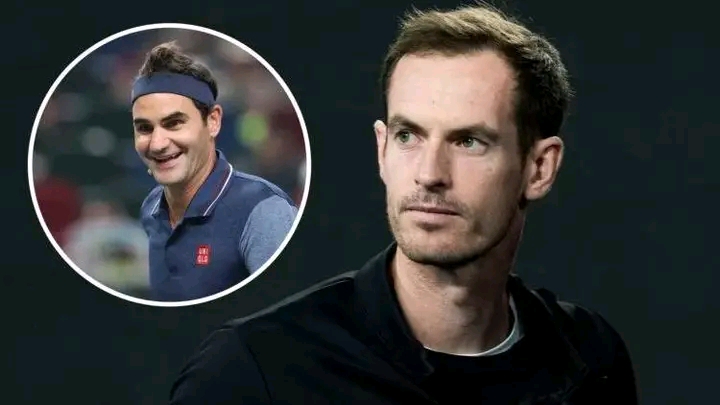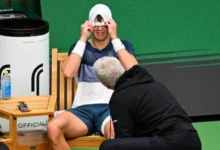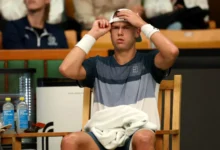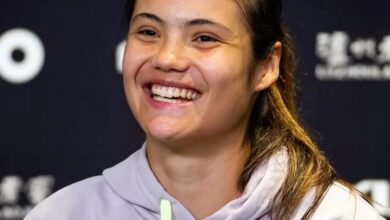“I Just Wanted One Game”: Andy Murray’s Heartbreaking Confession About His Most Humiliating Defeat to Roger Federer

Andy Murray, the British tennis icon who battled through the golden era of the Big Four, is no stranger to high-stakes matches and crushing defeats. With three Grand Slam titles, two Olympic gold medals, and a 41-week stint as World No. 1, Murray’s career is a testament to resilience against titans like Roger Federer, Rafael Nadal, and Novak Djokovic. But even a champion of his caliber has moments that haunt him. In a candid interview on *The Tennis Mentor* YouTube channel in July 2025, just weeks before his retirement after the 2024 Paris Olympics, Murray opened up about the worst match of his career—a 2014 ATP Finals thrashing by Roger Federer that left him “completely humbled” and desperate to win just a single game. For fans scrolling through X on their phones, this emotional revelation has sparked a wave of sympathy and reflection on Murray’s storied rivalry with the Swiss legend. Here’s the gripping story of that devastating night at the O2 Arena, Murray’s struggle to rebuild, and the legacy he leaves behind.
A Night to Forget at the O2
It’s November 13, 2014, and London’s O2 Arena is packed with nearly 18,000 fans, including high-profile spectators like Pippa Middleton and then-Chelsea manager Jose Mourinho. The ATP World Tour Finals, the season-ending showdown for the top eight players, is in full swing. Andy Murray, then 27 and ranked World No. 6, steps onto the court for a must-win group-stage match against Roger Federer, the 17-time Grand Slam champion and World No. 2. Murray, fresh off a valiant effort to qualify for the elite event after a grueling post-back-surgery season, is riding a wave of momentum from recent wins in Valencia and Vienna. But what unfolds over the next 56 minutes is a nightmare he’ll never forget.
From the first point, Federer is relentless. His serve is pinpoint, his volleys are surgical, and his movement is effortless, defying his 33 years. Murray, by contrast, is off-kilter. His first serve deserts him, his forehand misfires, and panic sets in as Federer races to a 6-0 first set in just 24 minutes. “I had no answers,” Murray later admits on *The Tennis Mentor*. “He was playing great, and I was playing awful.” The second set is no better. Federer surges to a 5-0 lead, with Murray trailing 0-30 on his own serve. The crowd, usually raucous in support of their home hero, falls into a stunned silence, hoping for a sliver of resistance.
“I don’t remember if it was 6-0, 5-0 or 6-0, 3-0 before I won my first game,” Murray recalls, his voice heavy with the weight of the memory. “It was the only time in my career where I was hoping just to win a single game. I really felt humiliated that day.” Finally, in the 12th game, Murray holds serve with a half-decent delivery to Federer’s backhand, avoiding the dreaded “double bagel” (6-0, 6-0). The crowd erupts in riotous cheers, but it’s a hollow victory. Federer seals the match 6-0, 6-1, advancing to the semifinals while Murray crashes out, his season ending in what he calls “the most complete drubbing of my career”
The Weight of Defeat
The 2014 loss wasn’t just a bad day—it was a public humiliation that cut deep. Murray, who had faced Federer 20 times before with an 11-9 head-to-head edge, was no stranger to the Swiss maestro’s brilliance. He’d beaten Federer in the 2012 Olympic final on Wimbledon’s Centre Court and in Masters 1000 finals in Toronto and Shanghai in 2010. But this match was different. “I’ve lost slam finals, and those hurt,” Murray tells *The Tennis Mentor*. “But this was in front of my home crowd, in a huge stadium. I felt like I let everyone down.
The defeat came at a vulnerable time. Murray was still recovering from back surgery in September 2013, a procedure that addressed chronic pain but left him grappling with his form. “It’s been a hard year,” he said post-match, his voice subdued. “I’ve learned a lot about my body, what it’s like to come back from tough surgery. But tonight, I was disappointed with my level.” His X post that night was raw: “Sorry about tonight, roger was incredible and I had no answers, support this week has been so good and wish I could have done better”
The presence of Jose Mourinho in the hallway afterward offered a small comfort. “He just gave me a hug and didn’t say anything,” Murray shares, a faint smile in his voice. “That made me feel a little bit better.” Even Gael Monfils, who faced Murray earlier in the tournament, chimed in during a press conference: “I was happy when you finally won a game. Inside I was happy.” But for Murray, the sting lingered. He hadn’t suffered such a lopsided loss since he was 16, against Jan Masik at a minor tournament in Gran Canaria in 2003.
A Rivalry Defined by Resilience
Murray’s rivalry with Federer, spanning 25 matches from 2005 to 2015, was a rollercoaster of triumphs and heartbreaks. Murray led 11-14 overall, with a 6-3 edge in Masters 1000 events, but Federer dominated in Grand Slams, winning 5-1, including finals at the 2008 US Open, 2010 Australian Open, and 2012 Wimbledon. The 2014 ATP Finals loss was particularly brutal because it came at a time when Murray was clawing his way back to the elite level after his 2012 US Open and 2013 Wimbledon titles.
Federer, reflecting on the match, called it “good fun,” a comment that underscored his relaxed brilliance that night. “He was extremely loose, trying shots he might not in other situations,” Murray noted, acknowledging Federer’s ability to elevate his game when it mattered most. Posts on X from 2014 capture the sentiment: “Federer just dismantled Murray like it was a practice session. Unreal.” Another user wrote, “Murray looked lost out there, but you can’t hate him for trying against that kind of genius.
The loss highlighted a recurring theme in Murray’s career: his ability to go toe-to-toe with the Big Three—Federer, Nadal, and Djokovic—only to fall short in defining moments. Of his 11 Grand Slam finals, eight were against Federer or Djokovic, with five losses to the former. Yet Murray’s resilience shone through. He bounced back in 2015, reaching the Australian Open final and leading Great Britain to a Davis Cup title, proving he could weather even the worst setbacks.
The Road to Recovery
The 2014 defeat became a turning point. “I’m not going to try and forget this,” Murray said at the time. “I’ll use it as motivation to change some things.” He headed to Miami for off-season training, working on his serve and physical conditioning. By 2015, he was back in top form, defeating Federer in the Cincinnati Masters semifinals and reaching the Wimbledon semifinals, where Federer again proved too strong, winning 7-5, 7-5, 6-4. “It would have taken something special to beat him,” Murray admitted, still hurting but defiant.
The 2014 loss also deepened Murray’s perspective. “Tennis humbles you,” he told *The Tennis Mentor*. “You lose most weeks, even the greatest players. Federer, Nadal, Djokovic—they’ve all been on the wrong end of bad days. It’s part of the game.” His ability to contextualize the defeat, even years later, reflects the mental growth that carried him through a career defined by battling the sport’s giants.
A Legacy Beyond the Scoreline
As Murray reflects on his career in 2025, retired and embracing new roles like coaching (briefly with Djokovic in 2024-2025) and storytelling on his *Centre Stage* tour, the 2014 Federer loss remains a poignant chapter. It’s not the Olympic golds, the 2013 or 2016 Wimbledon titles, or the 46 ATP titles that define him—it’s his refusal to give up. “I’ve lost slam finals, I’ve been bagelled, I’ve been booed,” he says. “But I kept showing up.” That resilience, coupled with his emotional honesty, has endeared him to fans. X posts after his *Tennis Mentor* interview read, “Andy talking about that Federer loss breaks my heart. He’s a warrior,” and “Murray’s honesty about feeling humiliated makes me respect him even more.”
Murray’s rivalry with Federer, though tilted in the Swiss’s favor in big moments, produced iconic matches. His 2012 Olympic final win (6-2, 6-1, 6-4) avenged the Wimbledon final loss weeks earlier, and his 2013 Australian Open semifinal victory showed he could match Federer’s brilliance. Federer himself praised Murray’s tenacity, saying in 2010, “He’s got everything you need to win big tournaments. Sometimes it just doesn’t happen when you want.” Murray proved him right, winning his first Grand Slam in 2012 at the US Open.
Why This Confession Resonates
Murray’s admission about the 2014 ATP Finals isn’t just about a 6-0, 6-1 scoreline—it’s about vulnerability in the face of greatness. Facing Federer at his peak, in front of a home crowd, and coming up empty was a low point that could have broken a lesser player. Instead, Murray used it to fuel his comeback, eventually reaching World No. 1 in 2016. His willingness to share this moment, years later, connects with fans who’ve faced their own moments of defeat. “I’ve had days where I felt like I didn’t belong,” one X user posted. “Andy’s story reminds me to keep going.”
As Wimbledon 2025 unfolds, with plans for a statue to honor Murray’s legacy, his confession is a reminder that even champions are human. The O2 Arena defeat may have humbled him, but it also showcased his heart—a heart that carried him through an era dominated by Federer, Nadal, and Djokovic, and left an indelible mark on tennis








